Porcelain crowns and veneers in Turkey
What are porcelain veneers and crown?
Porcelain veneers and crowns are dental restorations used to improve the appearance and function of teeth.
Porcelain veneers are thin, custom-made shells made of dental porcelain that are bonded to the front surface of the teeth. They are primarily used for cosmetic purposes to enhance the appearance of teeth that are discolored, misaligned, chipped, or have gaps between them. Veneers are designed to match the natural color and shape of your teeth and can provide a straighter, whiter, and more uniform smile. The procedure typically involves removing a small amount of enamel from the front surface of the teeth and then placing the veneers using dental adhesive.
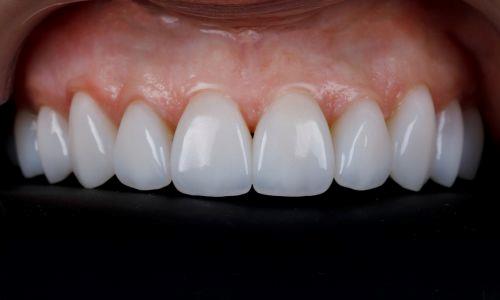
Porcelain Crowns (Dental crowns, also known as porcelain crowns or dental caps) are tooth-shaped restorations that encase the entire visible portion of a tooth. Unlike veneers, which only cover the front surface, crowns cover the entire tooth structure above the gum line. Crowns are commonly used to restore and protect teeth that are severely damaged, decayed, weakened, or have undergone root canal treatment. They can also be used for cosmetic purposes to improve the appearance of misshapen or severely discolored teeth. Crowns are custom-made to match the color, shape, and size of your natural teeth and are cemented into place over the prepared tooth structure.
Both porcelain veneers and crowns are durable and resistant to stains, providing long-lasting results. However, the decision to choose between veneers and crowns depends on the specific dental condition and the goals of the patient. It is best to consult with a dentist who can assess your situation and recommend the most appropriate treatment option for your needs.
What are pros and cons of porcelain veneers and crowns?
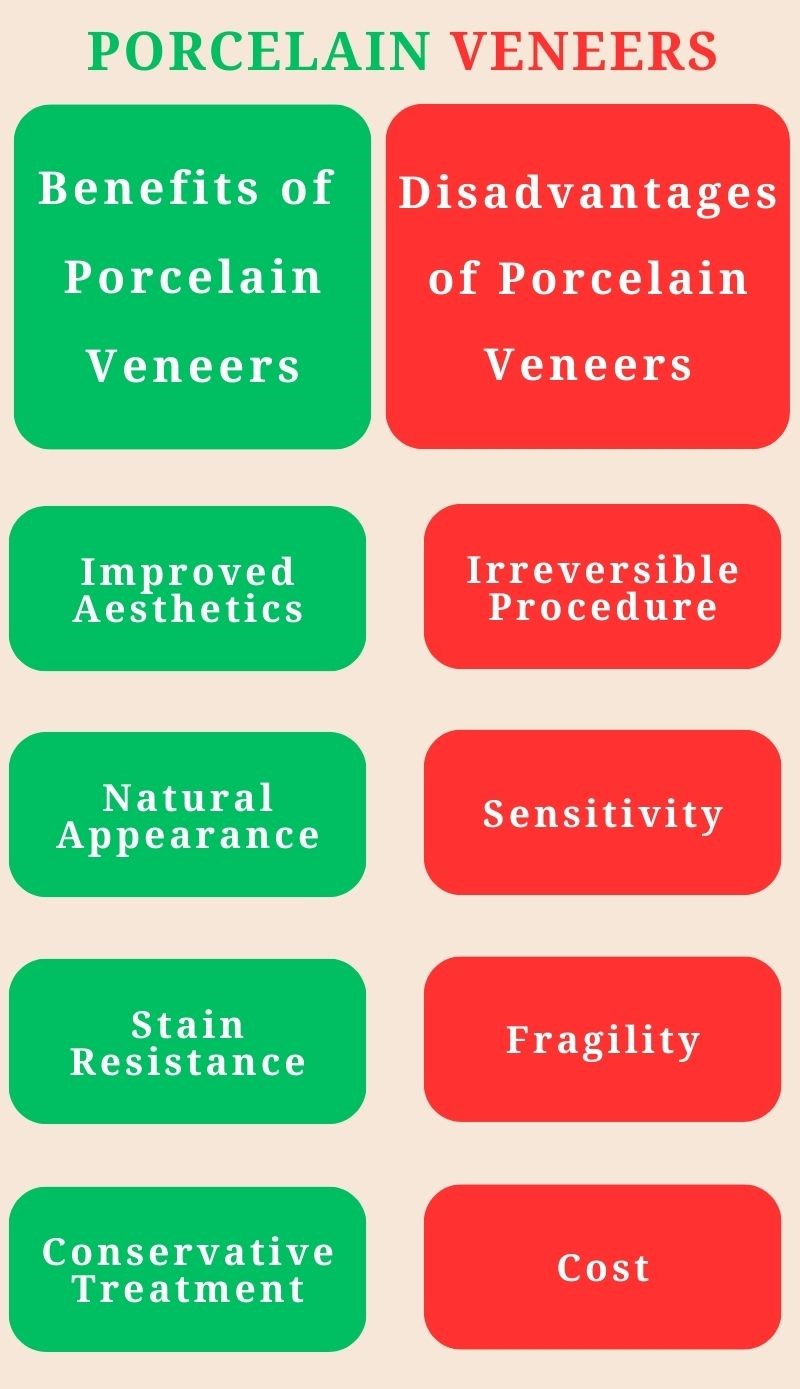
Benefits of Porcelain Veneers:
- Improved Aesthetics: Veneers can dramatically enhance the appearance of your smile by correcting tooth discoloration, gaps, misalignment, and other cosmetic imperfections.
- Natural Appearance: Porcelain veneers closely resemble natural teeth in color, translucency, and texture, providing a natural-looking result.
- Stain Resistance: Porcelain is highly resistant to stains, allowing your veneers to maintain their bright and attractive appearance.
- Conservative Treatment: Veneers require minimal tooth preparation, often involving the removal of a thin layer of enamel, making it a relatively conservative option compared to crowns.
Disadvantages of Porcelain Veneers:
- Irreversible Procedure: The removal of enamel is permanent, and once veneers are placed, you will always require veneers or an alternative restoration on those teeth.
- Sensitivity: Some individuals may experience temporary tooth sensitivity after veneer placement, especially if a significant amount of enamel is removed during the preparation.
- Fragility: While porcelain is durable, it is more prone to chipping or cracking compared to natural teeth or other restorative materials.
- Cost: Porcelain veneers can be expensive, and the cost may vary depending on the number of teeth being treated and the complexity of the case.
Benefits of Porcelain Crowns:
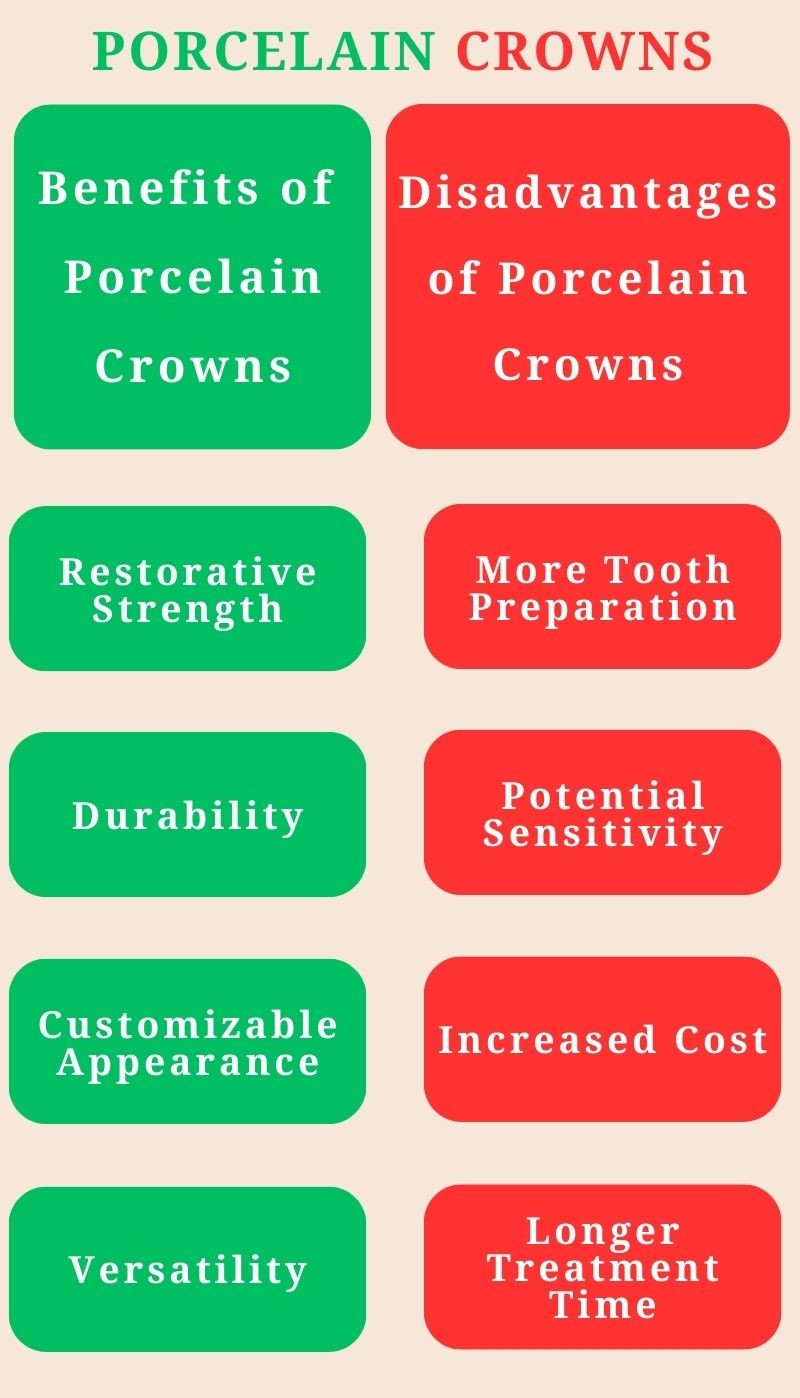
- Restorative Strength: Crowns provide excellent strength and support to teeth that are significantly damaged, decayed, or weakened, restoring their functionality.
- Durability: Porcelain crowns are highly durable and can withstand normal biting and chewing forces, offering long-term stability.
- Customizable Appearance: Crowns can be customized to match the color, shape, and size of your natural teeth, providing a seamless and aesthetically pleasing result.
- Versatility: Crowns can address both cosmetic concerns and structural issues, making them a versatile treatment option.
Disadvantages of Porcelain Crowns:
- More Tooth Preparation: Compared to veneers, crowns require more extensive tooth preparation, which involves removing a significant portion of the tooth structure.
- Potential Sensitivity: Similar to veneers, some individuals may experience temporary tooth sensitivity after crown placement.
- Increased Cost: Porcelain crowns are generally more expensive than veneers due to the additional material and laboratory work involved.
- Longer Treatment Time: The process of getting a crown typically requires multiple dental visits and may take longer to complete compared to veneers.
It's important to note that the specific benefits and disadvantages can vary depending on individual cases, and it's recommended to consult with a qualified dentist to determine the best treatment option for your unique needs.
Who can have porcelain veneers and crowns?
Determining your candidacy for porcelain veneers or crowns requires a thorough evaluation by a qualified dentist. However, here are some general factors that dentists consider when assessing candidacy for these treatments:
Porcelain Veneers:
- Tooth Condition: Veneers are typically recommended for teeth with cosmetic issues such as discoloration, minor misalignment, chips, or gaps. If your teeth have significant structural damage or decay, other restorative options like crowns may be more suitable.
- Sufficient Tooth Enamel: Veneers require the removal of a thin layer of enamel to accommodate the thickness of the veneer. Sufficient enamel is necessary for a successful veneer placement.
- Oral Health: You should have good oral health, including healthy gums and no active gum disease or untreated tooth decay, before considering veneers.
- Bite Alignment: Veneers may not be recommended if you have severe bite misalignment or a significant overbite/underbite. In such cases, orthodontic treatment or other dental procedures may be necessary.
Porcelain Crowns:
- Tooth Damage: Crowns are often used to restore teeth with significant structural damage, decay, or fractures that cannot be adequately repaired with more conservative treatments.
- Root Canal Treatment: Teeth that have undergone root canal treatment are often crowned to protect the weakened tooth structure and restore functionality.
- Large Fillings: Teeth with large fillings that compromise their strength and stability may require crowns to reinforce and protect them.
- Esthetic Concerns: Crowns can also be used for cosmetic purposes to improve the appearance of severely discolored, misshapen, or poorly positioned teeth.
It is best to consult with a dentist who can evaluate your specific oral condition, discuss your treatment goals, and provide personalized recommendations based on your unique situation. They will be able to determine if porcelain veneers, crowns, or any other dental treatments are suitable for you.
What are steps of porcelain veneers and crowns treatment?
Porcelain crowns and veneers are often applied in a multi-step process. Here is a detailed explanation of each process:
- Porcelain veneers
Your dentist will ask you about your objectives and goals during your initial consultation. To assess your oral health and establish whether you're a good candidate for veneers, your dentist will inspect your teeth, take impressions, and sometimes X-rays or photographs.
In this stage, the front surfaces of the teeth that will receive veneers have a tiny bit of enamel removed. Usually, the thickness of the veneer is equal to the amount of enamel that is removed. In order to assure your comfort throughout the procedure, local anesthetic may be administered.
After your teeth have been cleaned and prepped, your dentist will make an impression of them. The dental laboratory will use this impression as a mold to make your personalized veneers.
Veneers: While your permanent veneers are being created, temporary veneers may be bonded to your teeth. These temporary veneers offer a temporary esthetic fix while guarding your prepared teeth.
Your customized porcelain veneers will be made by the dental laboratory using the impressions you provided. This procedure could take a few weeks. Your natural teeth's natural shape, size, and color will be replicated by the veneers.
When your permanent veneers are prepared, you'll go back to the dentist's office for the last stage, veneer bonding. Your teeth will be properly cleaned by your dentist after the temporary veneers are removed. The temporary placement of the veneers on your teeth allows the dentist to assess their fit, look, and color. If necessary, adjustments can be done. Once everything is in order, a dental glue is used to adhere the veneers to your teeth, and a special light is utilized to solidify the adhesive.
- Porcelain crowns:
Just as with veneers, your dentist will examine your teeth during your initial appointment, talk to you about your treatment objectives, and decide whether or not crowns are the best option. The health of your tooth may be assessed using X-rays or other diagnostic equipment.
In order to prepare the impacted tooth, any decaying or damaged regions must be removed. To make room for the thickness of the crown, a piece of the tooth's structure is also removed. Your comfort during this procedure may be ensured by the use of local anesthetic.
An impression of your tooth and the surrounding area is taken after dental preparation. To create your personalized crown, the dental laboratory will receive this impression.
Your dentist will install a temporary crown over the prepared tooth to safeguard it and preserve its appearance while your permanent crown is being created.
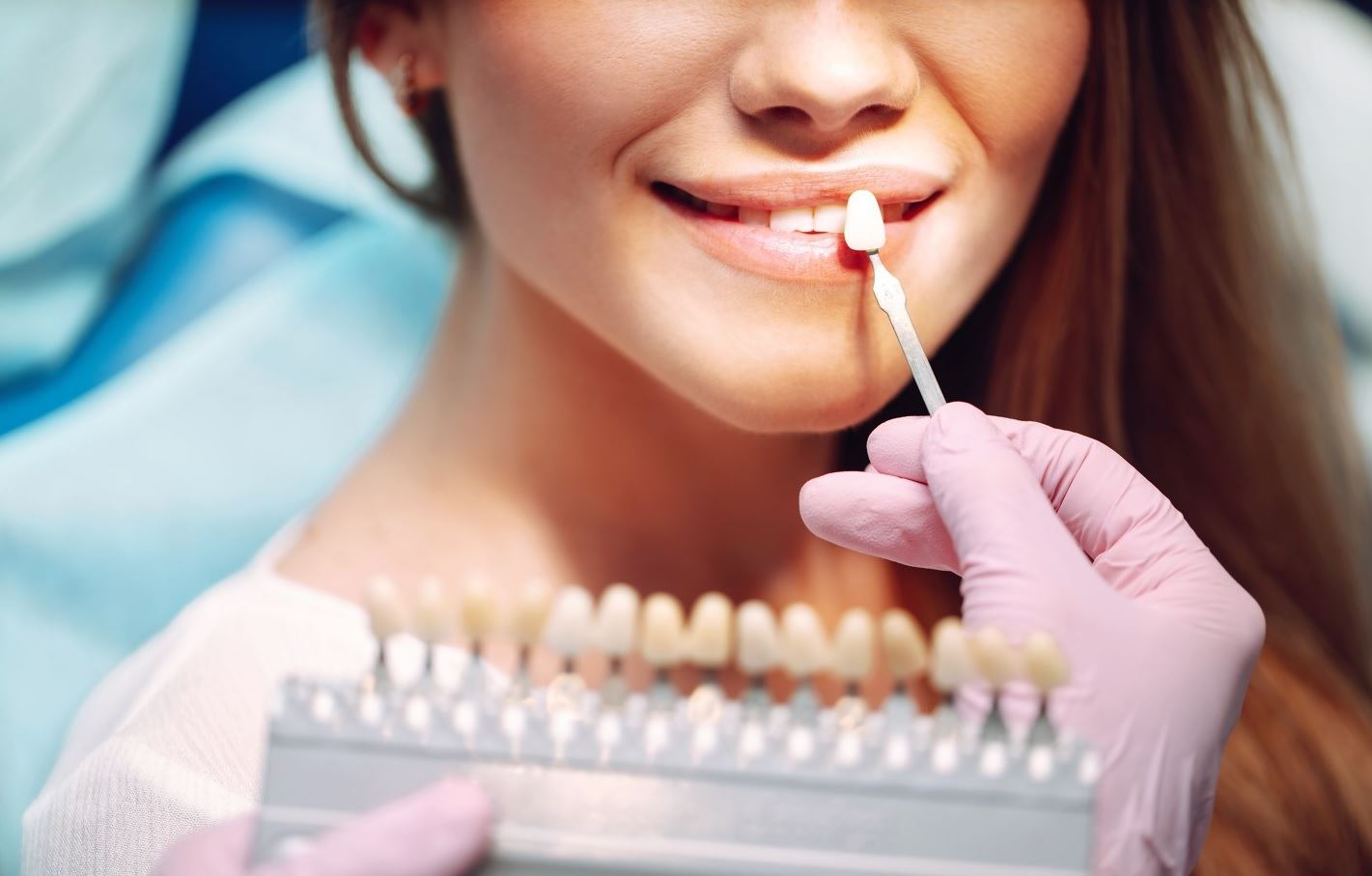
Your personalized crown will be made in the dental laboratory using the impression. The fabrication of the crown could take a few weeks. Usually, porcelain or a combination of materials is used to create the crown.
You'll need to go back to the dentist's office for the last step once your permanent crown is prepared. In order to check the permanent crown's fit, look, and color, your dentist will remove the temporary crown. If necessary, adjustments can be done. Once all is in order, a dental glue is used to attach the permanent crown on your tooth.
It's vital to remember that the precise procedures and timing may change based on your unique situation and the dentist's recommended methods. Your dentist will walk you through each stage and give you particular instructions and knowledge about your procedure.
FREQUENTLY ASKED QUESTIONSHow much do porcelan veneers and crown cost in Turkey?
Several variables, including the intricacy of the case, the number of teeth involved, the particular dental facility, and the location within Turkey, might affect the price of porcelain teeth treatment in Turkey. It's crucial to remember that prices can fluctuate over time and that I don't have access to real-time pricing data. Compared to many Western nations, Turkey is frequently seen as an economical location for dental procedures. Dental procedures may be more affordable in Turkey for a number of reasons, including the following:
- In average, Turkey's dental clinics have lower operating costs thanks to lower labor costs, fewer overhead costs, and more reasonably priced dental supplies and equipment.
- Exchange rates can significantly contribute to lowering the cost of medical care for people from other countries. For people going from nations with stronger currencies, dental procedures may be more affordable due to the Turkish lira's exchange rate against major currencies.
- Turkey's dentistry industry is competitive, with several clinics providing a range of services. Price reductions brought about by this competition may increase patient access to and affordability of dental care.
- The Turkish government has worked to promote dental travel as well as other medical travel. They have put in place measures to draw patients from abroad, including as expedited visa procedures and the construction of infrastructure, which can help keep costs down.
- Despite being reasonably priced, many Turkish dental clinics uphold high standards of quality and follow globally acknowledged protocols and principles. These clinics frequently employ contemporary methods and materials and have qualified and knowledgeable dentists.
While price is a significant consideration, it's critical to also take the dental clinic's reputation and level of service into account when choosing. To guarantee safe and successful treatment outcomes, it's essential to do your research and choose a reputed office with skilled dentists. For precise pricing details and to discuss your particular treatment needs and expectations, it is advised that you get in touch with dental clinics directly.
Will I feel pain during porcelain veneers and crowns treatment?
The placement of porcelain veneers and crowns is typically not painful. The procedures are performed using local anesthesia to numb the teeth and surrounding tissues, ensuring that you experience minimal discomfort during the treatment. You may feel slight pressure or vibrations during the tooth preparation process, but it should not be painful.
After the procedure, it is common to experience some temporary sensitivity or discomfort, especially around the treated teeth. This sensitivity is usually mild and can be managed with over-the-counter pain relievers or desensitizing toothpaste. It should subside within a few days to a week as your teeth adjust to the new restorations. It's important to note that every individual's pain tolerance and response to dental procedures may vary. Some people may experience minimal discomfort or sensitivity, while others may be more sensitive or have additional factors that contribute to discomfort. If you have any concerns about pain or discomfort during or after the placement of porcelain veneers or crowns, it is best to discuss them with your dentist. They can provide information specific to your case, address any questions or anxieties you may have, and ensure your comfort throughout the process.
Are porcelain veneer and crown treatment in Turkey safe?
Porcelain veneer and crown treatments in Turkey can be safe when performed by qualified and reputable dentists in well-established clinics. Turkey has a growing reputation as a popular destination for medical and dental tourism, and many clinics in the country maintain high standards of safety and quality. Here are some reasons why porcelain veneer and crown treatments in Turkey can be considered safe:
- Skilled Dentists: Turkey has a large number of highly skilled and experienced dentists who have received their education and training from reputable institutions. Many dentists in Turkey also participate in continuing education courses to stay updated with the latest advancements in dental techniques and technologies.
- Accredited Clinics: There are several dental clinics in Turkey that are accredited by international organizations or have certifications from local health authorities. These accreditations indicate that the clinics meet certain standards of quality, safety, and infection control protocols.
- Modern Facilities and Technology: Many dental clinics in Turkey are equipped with modern dental technology and use advanced techniques and materials for porcelain veneer and crown treatments. This enables dentists to provide safe and effective procedures.
- Stringent Sterilization and Infection Control: Reputable dental clinics in Turkey follow strict sterilization and infection control protocols to ensure a safe treatment environment. They adhere to international standards for hygiene and sanitation, including proper instrument sterilization, disposable materials, and a clean treatment environment.
- Patient Reviews and Recommendations: Before choosing a dental clinic in Turkey, it is recommended to research and read patient reviews and testimonials. These can provide insights into the experiences of other patients who have undergone porcelain veneer and crown treatments in Turkey.
While Turkey can offer safe dental treatments, it is essential to exercise caution and do thorough research when selecting a dental clinic. Consider factors such as the dentist's qualifications, the clinic's reputation, patient reviews, and accreditation or certifications. Additionally, ensure that you have open communication with the dentist, discuss your treatment plan and expectations, and address any concerns you may have. It is also advisable to consult with your own dentist or seek a second opinion before making a decision to undergo treatment abroad. They can provide guidance based on your specific dental needs and help you make an informed decision.
What should you do before and after porcelain veneer and crown treatment?
Before Porcelain Veneer and Crown Treatment:
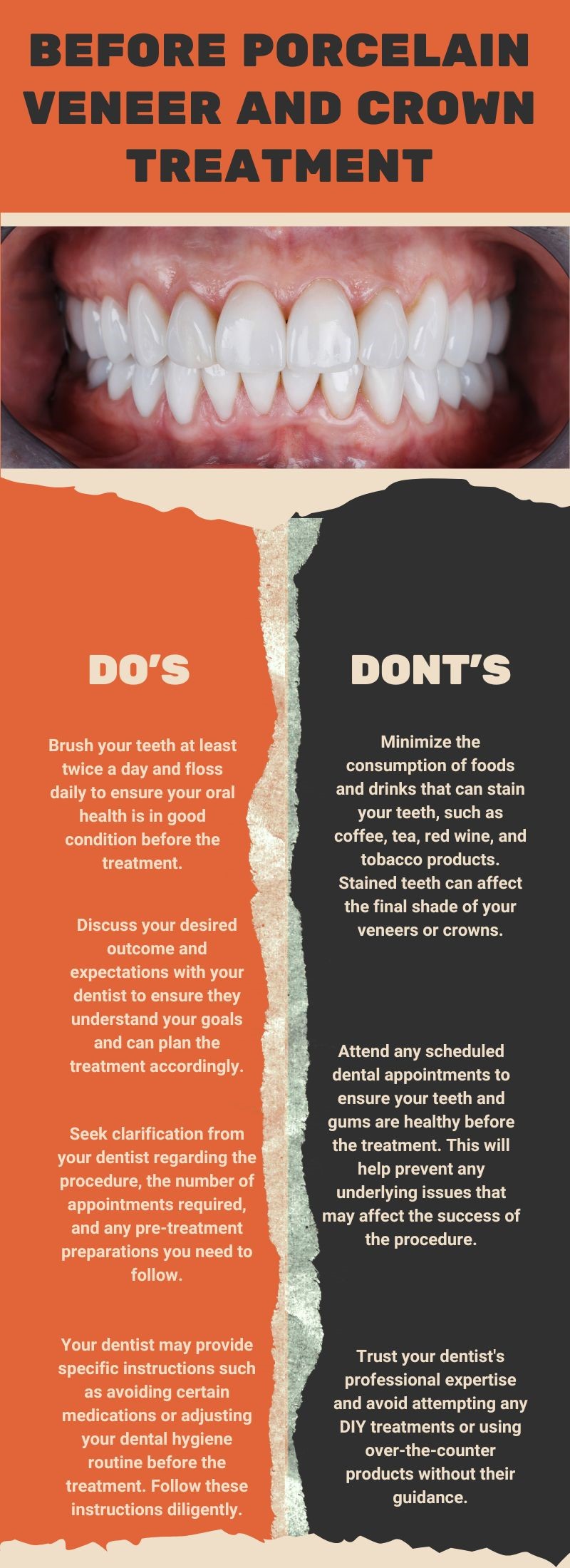
Do these
- Brush your teeth at least twice a day and floss daily to ensure your oral health is in good condition before the treatment.
- Discuss your desired outcome and expectations with your dentist to ensure they understand your goals and can plan the treatment accordingly.
- Seek clarification from your dentist regarding the procedure, the number of appointments required, and any pre-treatment preparations you need to follow.
- Your dentist may provide specific instructions such as avoiding certain medications or adjusting your dental hygiene routine before the treatment. Follow these instructions diligently.
Don't do
- Minimize the consumption of foods and drinks that can stain your teeth, such as coffee, tea, red wine, and tobacco products. Stained teeth can affect the final shade of your veneers or crowns.
- Attend any scheduled dental appointments to ensure your teeth and gums are healthy before the treatment. This will help prevent any underlying issues that may affect the success of the procedure.
- Trust your dentist's professional expertise and avoid attempting any DIY treatments or using over-the-counter products without their guidance.
After Porcelain Veneer and Crown Treatment:
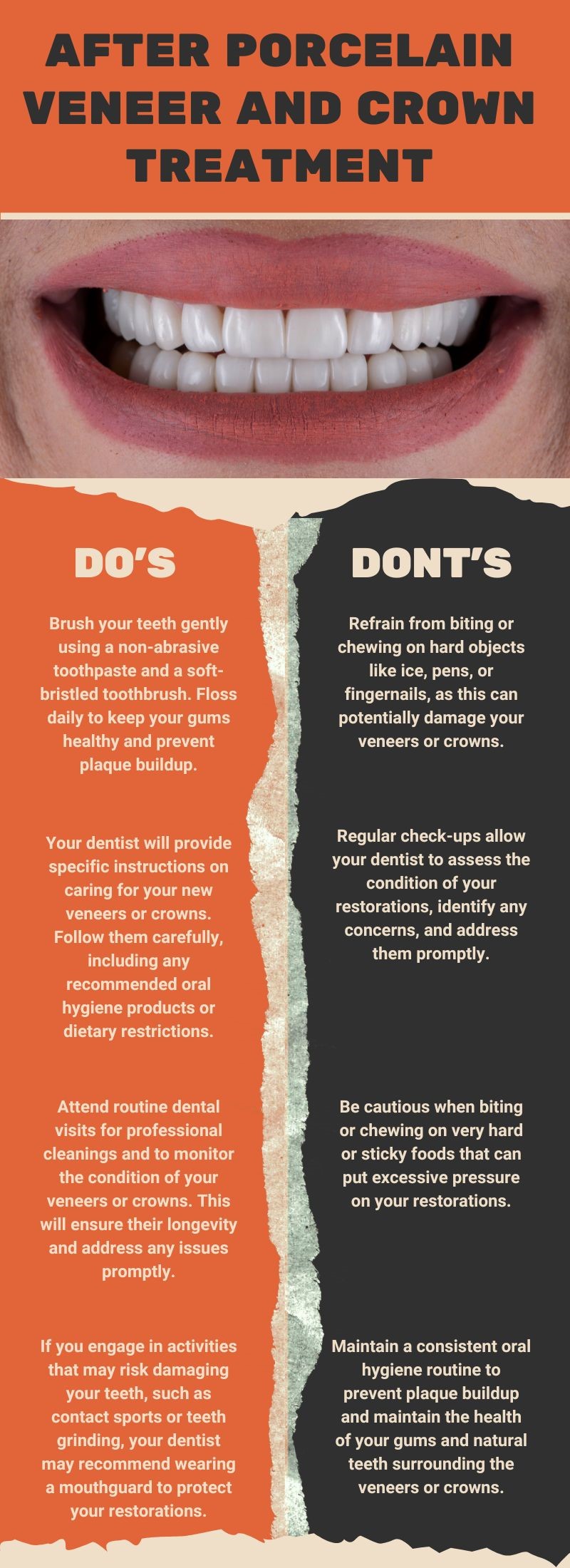
Do these
- Brush your teeth gently using a non-abrasive toothpaste and a soft-bristled toothbrush. Floss daily to keep your gums healthy and prevent plaque buildup.
- Your dentist will provide specific instructions on caring for your new veneers or crowns. Follow them carefully, including any recommended oral hygiene products or dietary restrictions.
- Attend routine dental visits for professional cleanings and to monitor the condition of your veneers or crowns. This will ensure their longevity and address any issues promptly.
- If you engage in activities that may risk damaging your teeth, such as contact sports or teeth grinding, your dentist may recommend wearing a mouthguard to protect your restorations.
Don't do
- Refrain from biting or chewing on hard objects like ice, pens, or fingernails, as this can potentially damage your veneers or crowns.
- Regular check-ups allow your dentist to assess the condition of your restorations, identify any concerns, and address them promptly.
- Be cautious when biting or chewing on very hard or sticky foods that can put excessive pressure on your restorations.
- Maintain a consistent oral hygiene routine to prevent plaque buildup and maintain the health of your gums and natural teeth surrounding the veneers or crowns.
What are differences between porcelain veneers and crowns?
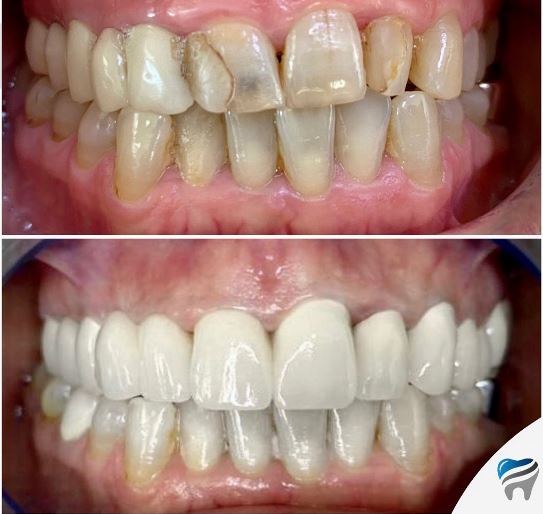
In order to improve the aesthetic aspect of teeth, porcelain crowns and veneers are applied to any broken or discolored teeth, particularly the anterior teeth. The lost dental functions are restored with both treatments. The main distinction between these two procedures is that a veneer simply covers the front of a tooth, but a crown completely encases it. Despite the differences between the applications, each had a significant degree of success. Since veneers are created from incredibly thin porcelain, their primary use is cosmetic. Utilizing medical adhesives, veneers are bonded to the front of teeth. The tooth surface is slightly abraded and a rough structure is created to help the veneer cling to the tooth underneath. In recently created coating kinds, there is hardly any abrasion process. For the necessary amount of coating adhesion, there must be enough tooth layer on the tooth. Typically, very thin porcelain or other materials are used to create veneers with an average thickness of 1 millimeter. In order to reinforce the tooth, repair damage, and improve appearance, porcelain crowns are preferred. Crowns, as opposed to veneers, completely encase the tooth and are typically 2 millimeters thick. Either all metal, all porcelain, or all mixed metals can be used to create it. The color of both crowns and veneers is the same as our natural teeth, with the exception of all-metal crowns.
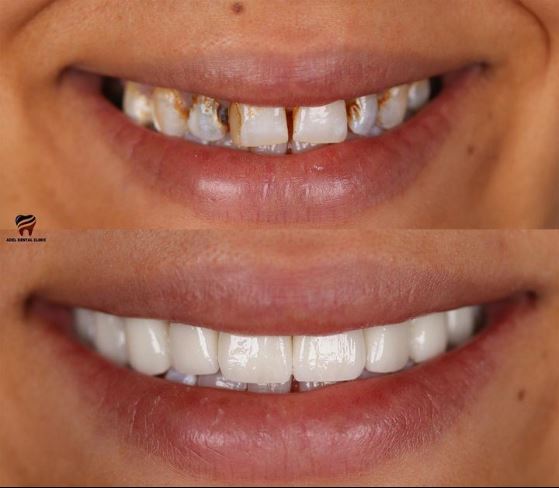
When compared to veneers, crowns abrade the tooth less because crown placement involves more intrusive treatments. For porcelain veneers, the front teeth are the most popular location. Front teeth are the ones that are most noticeable and have the biggest influence on grin. Coating the anterior teeth for aesthetic reasons, in addition to repairing damaged teeth, improves a person's self-image, self-confidence, and youthful appearance. Motils are best treated with porcelain crowns. People who are not allergic to metal should benefit from the durability of porcelain crowns combined with metals because these teeth are not particularly noticeable. Based on your teeth or gums' health, their position, and how visible they are, your dentist will advise you on the ideal kind of porcelain. When deciding which crown to utilize, there are a few things to keep in mind.
What are some risks of porcelain veneers and crowns treatments?
Porcelain teeth treatments, such as porcelain veneers and crowns, are generally safe and have minimal side effects. However, there are a few potential side effects and considerations to be aware of:
- Some individuals may experience temporary tooth sensitivity after getting porcelain veneers or crowns. This sensitivity is usually mild and should subside within a few days to a week. Using desensitizing toothpaste or over-the-counter pain relievers can help manage this sensitivity.
- The placement of veneers or crowns may cause temporary gum irritation or inflammation around the treated teeth. This can be managed by practicing good oral hygiene and maintaining proper oral care.
- Although rare, some individuals may have allergies or sensitivities to the materials used in porcelain restorations. It's important to inform your dentist about any known allergies or sensitivities to ensure appropriate materials are used.
- To accommodate the thickness of the veneers or crowns, a thin layer of enamel is removed from the teeth. This process is irreversible, meaning the tooth will always require a restoration to protect it. However, modern techniques aim to preserve as much tooth structure as possible.
- While efforts are made to match the color of the porcelain restorations to your natural teeth, it's important to note that porcelain materials may not be as responsive to teeth whitening procedures. If you plan to undergo teeth whitening in the future, it's advisable to do it before getting porcelain restorations.
- Porcelain veneers and crowns are durable and can last for many years with proper care. However, they may require eventual replacement or repair due to normal wear and tear. Regular dental check-ups and maintenance, such as avoiding excessive force or pressure on the restorations, can help prolong their lifespan.
Is the success rate of porcelain veneers and crowns procedure high?
Porcelain veneers and crowns have a high success rate when performed by skilled and experienced dentists. The success of these procedures can be influenced by several factors, including the individual's oral health, proper treatment planning, precise tooth preparation, accurate fabrication of the restorations, and adherence to post-treatment care. While it is difficult to provide an exact success rate, studies and clinical observations indicate that the success rate of porcelain veneers and crowns is generally high. According to a systematic review published in the Journal of Dentistry, the survival rate of porcelain veneers ranged from 94.5% to 100% over a 5- to 10-year follow-up period. This suggests that the majority of patients experience successful outcomes and long-term satisfaction with their veneers. Similarly, porcelain crowns also have a high success rate. A study published in the Journal of Prosthodontics reported a success rate of 95.4% for porcelain-fused-to-metal crowns over a 10-year period. Advances in all-ceramic materials have further improved the success and aesthetics of porcelain crowns.
It's important to note that the success and longevity of porcelain veneers and crowns can vary among individuals due to factors such as oral hygiene practices, oral habits, and overall oral health. Proper maintenance, regular dental check-ups, and following your dentist's post-treatment instructions can significantly contribute to the long-term success of these restorations. During your consultation with a dentist, they can provide you with more specific information about the success rate of porcelain veneers and crowns based on their experience and expertise. They will also evaluate your individual case to determine if you are a suitable candidate for the treatment and discuss your expected outcomes.
